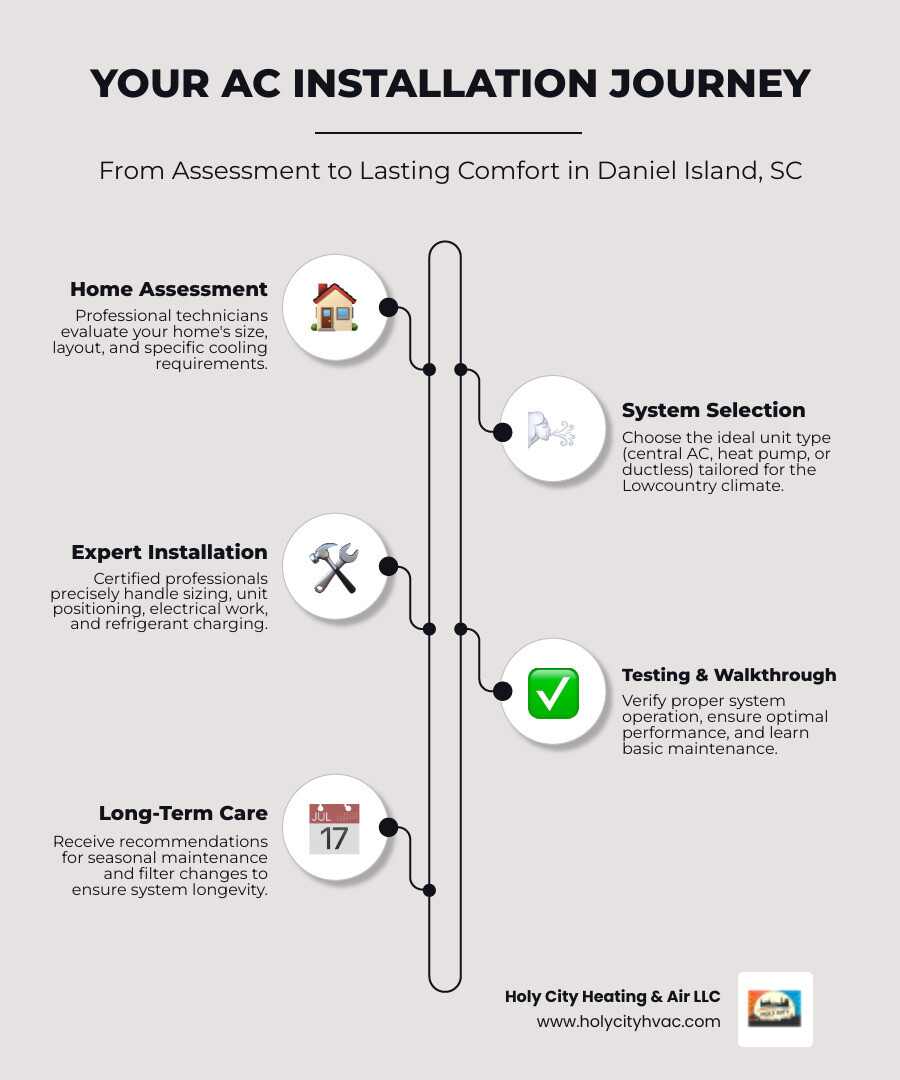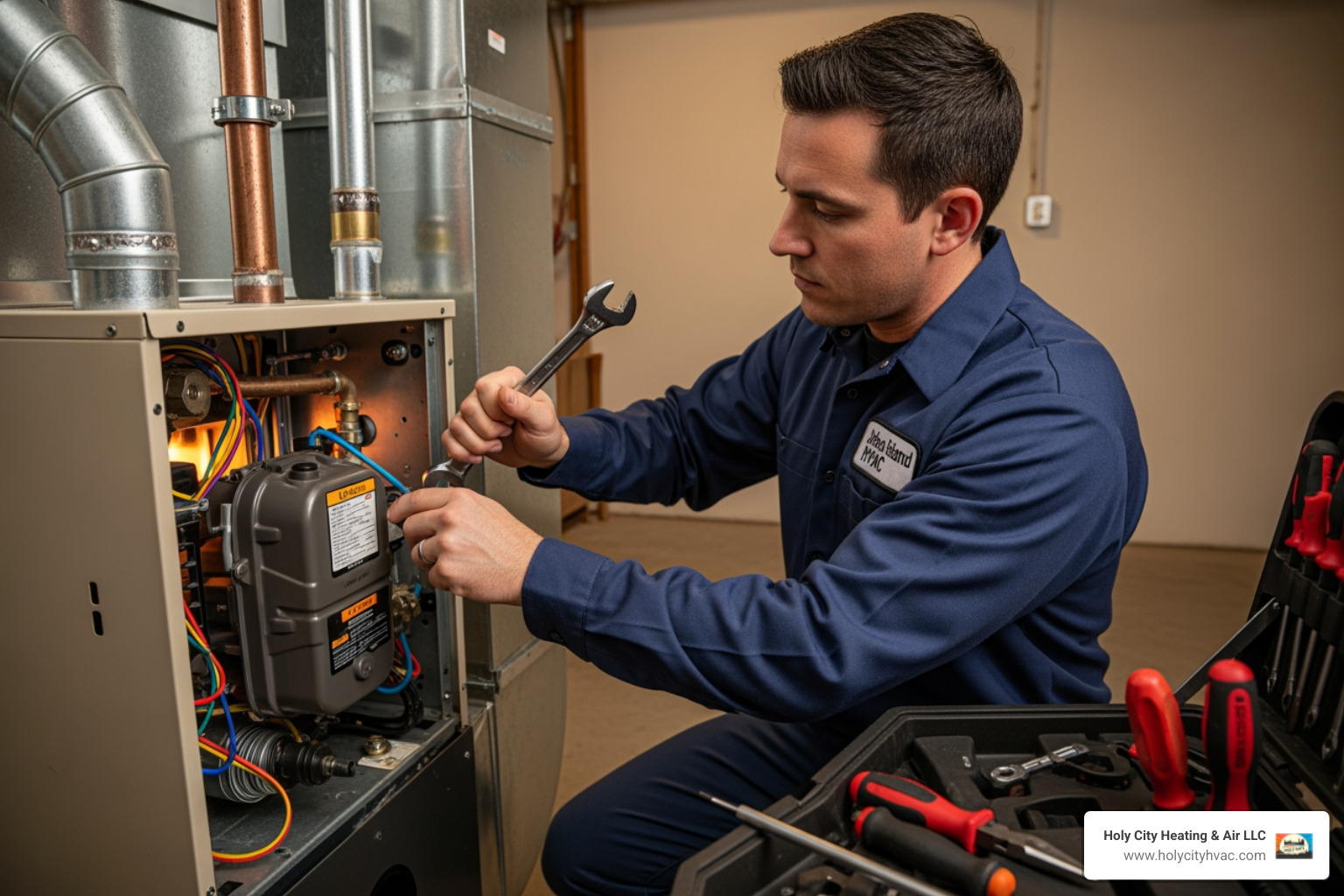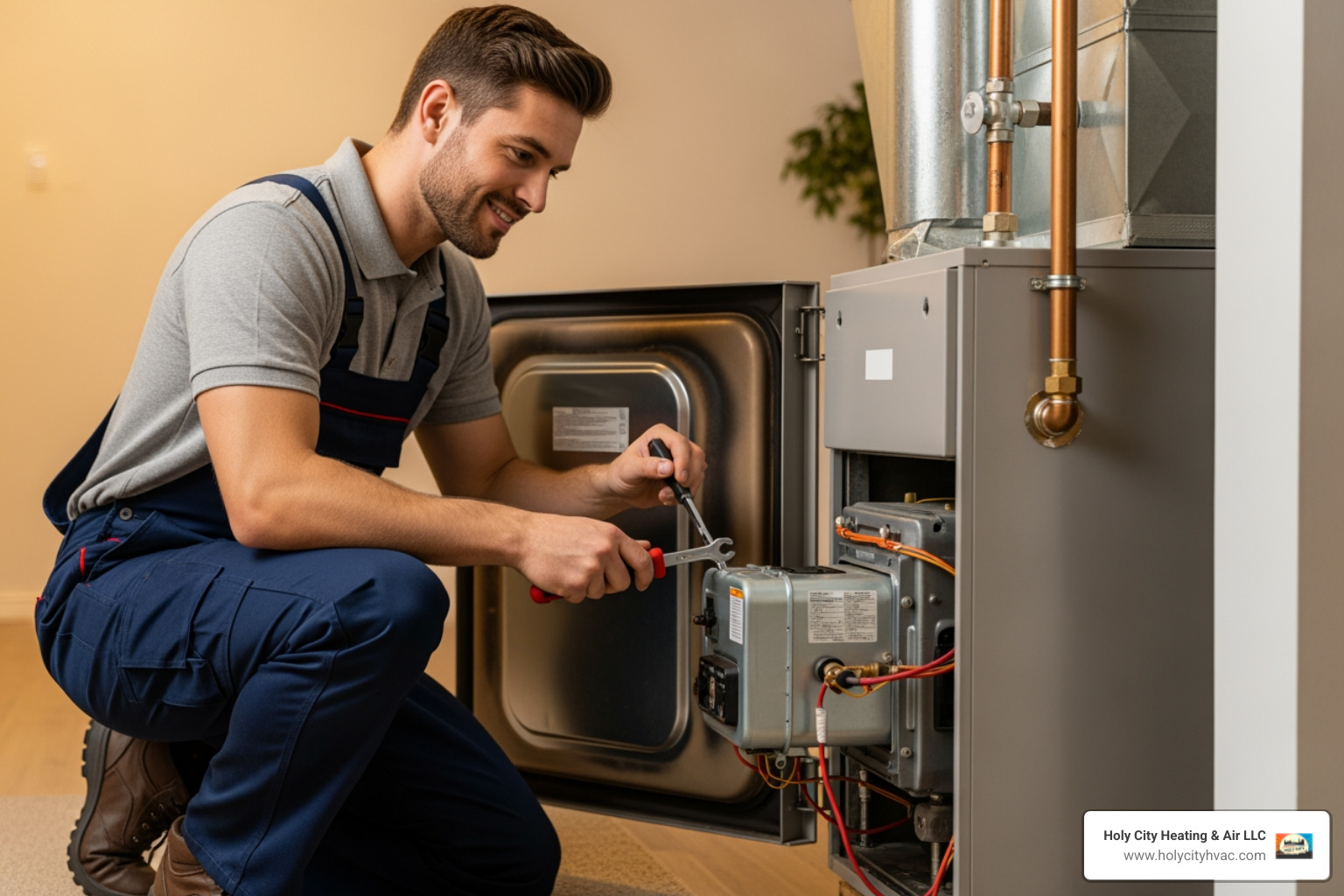
Why Water Main Repair Matters to Charleston Homeowners
Water main repair is a home emergency that can disrupt your day. When water starts gushing from your yard or your water pressure drops, you need answers fast.
Quick Answer for Water Main Repair:
- Shut off your main water valve immediately to stop further damage.
- Call a licensed plumber - this isn't a DIY job.
- Check responsibility - repairs before your water meter are usually the city's job.
- Expect costs between $500-$2,000 for typical repairs.
- Plan for 1-3 days to complete most water main repairs.
Water lines are built to last around 50 years, but Charleston's humid climate and shifting soil can accelerate problems like pipe corrosion. The tricky part is figuring out who is responsible. Many homeowners don't realize the difference between the city's water main and their private service line. Getting this wrong can mean waiting for help that's never coming.
Whether you're dealing with soggy spots in your yard or sky-high water bills, understanding water main repair can save you thousands in damages and get your water flowing again.
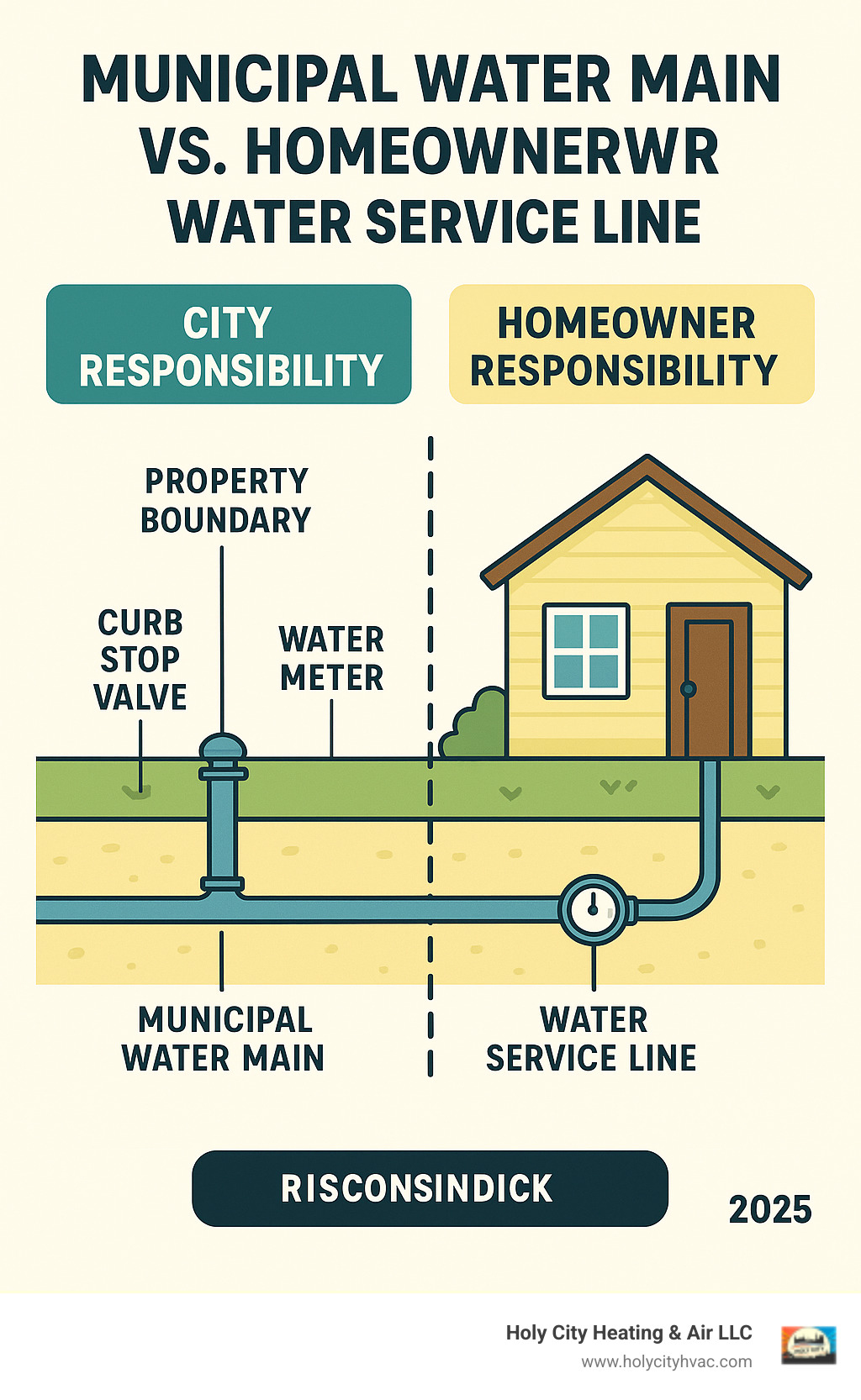
Is Your Water Main in Trouble? Telltale Signs and Common Culprits
Your water main repair needs often show up unexpectedly through mysterious puddles, strange sounds, and high bills. Knowing the signs can help you act before a small issue becomes a disaster.
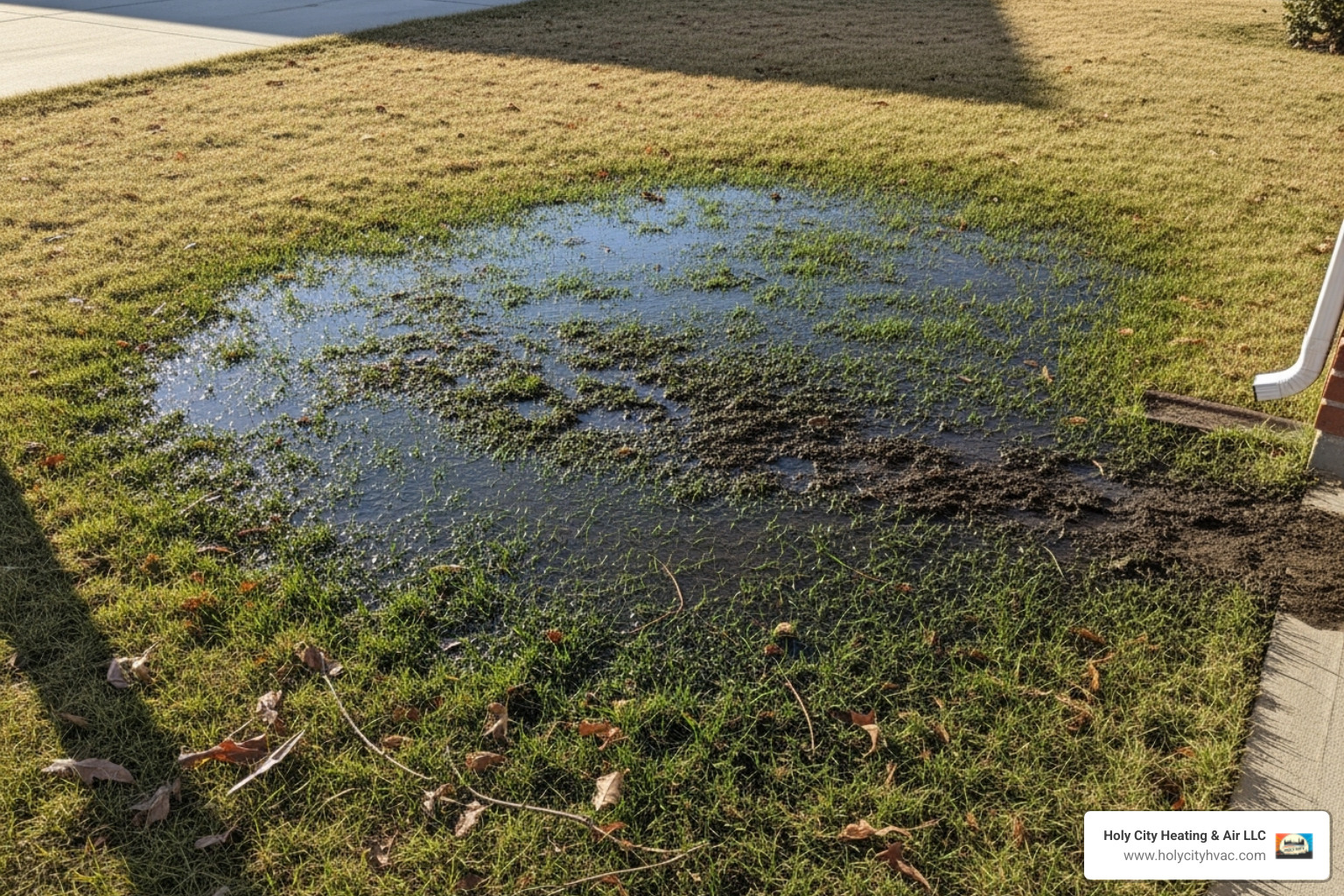
Spotting the Leak: Signs You Need a Repair
When a water main has trouble, your home will give you hints:
- Sudden high water bills: Your meter measures escaping water, so you pay for water you're not using.
- Soggy patches in your yard: A classic sign, especially during dry weather between your house and the street.
- Sound of running water: A mysterious hissing or running sound when all faucets are off.
- Sudden drop in water pressure: If your shower becomes a trickle, water might be escaping before it reaches your taps.
- Discolored or rusty water: Brown or reddish water suggests rust or sediment is entering your supply through a damaged pipe.
- Foundation cracks or water damage: A persistent leak can saturate the soil around your foundation, leading to structural issues or water in basements and crawl spaces.
Why Water Mains Fail: The Root Causes
Water lines face a constant battle against time and the elements. Here are the common culprits:
- Pipe corrosion: A major issue, especially for older cast iron or galvanized steel pipes common in homes built before 1980.
- Aging pipes: Most lines are designed to last about 50 years before becoming brittle and prone to breaks.
- Tree roots: Roots seek moisture and can invade pipes through tiny cracks, causing blockages and breaks.
- Shifting soil: Charleston's clay soil expands and contracts, stressing underground pipes.
- Extreme temperature changes: Cold snaps can freeze water inside pipes, causing them to expand and break.
- High water pressure: Excessive pressure accelerates wear and tear on your entire plumbing system.
Recognizing these signs and causes helps us diagnose your water line problems and find a lasting solution.
Your Yard, Your Pipe, Your Problem? Understanding Homeowner Responsibility
When water starts bubbling up in your yard, the big question is: who pays for the fix? Many homeowners are surprised to learn the repair is their responsibility.
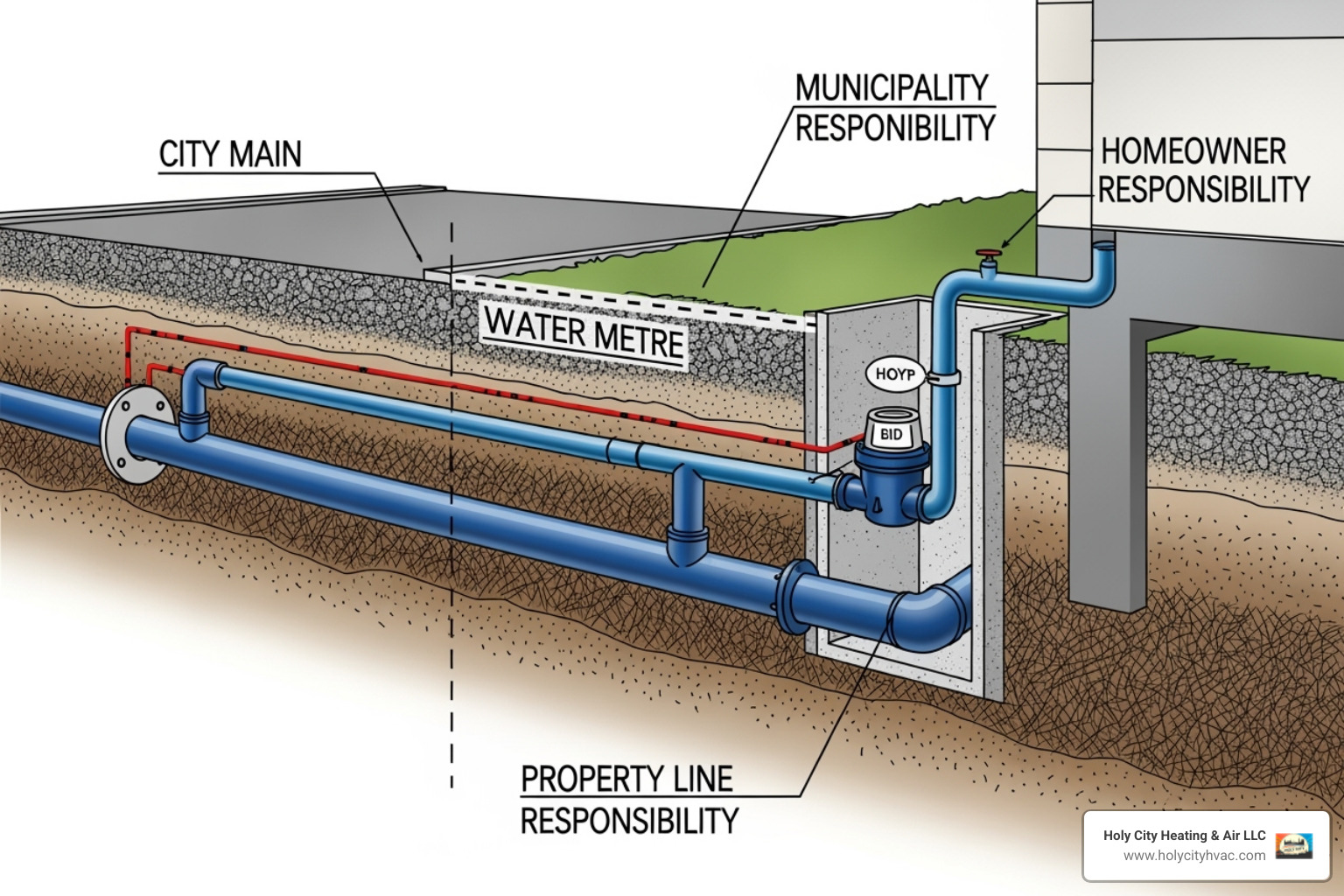
The water system serving your home has two parts: the municipal water system (the city's responsibility) and your private service line (which is yours). Understanding the difference can save you time and money.
Drawing the Line: Who Pays for the Repair?
Think of it as a handoff. The city is responsible for the main water line under the street, typically up to the curb stop valve or your water meter. From that point to your house, it's your private service line. Any water main repair needed in this section is the homeowner's responsibility.
The exact point of responsibility can vary by municipality, so it's always wise to call your local utility to confirm. This simple step can prevent you from waiting for help that isn't coming.
Will Insurance Cover Your Water Main Repair?
Unfortunately, the answer is usually no. Standard homeowners insurance policies typically exclude water main repair because they view aging pipes, corrosion, and root damage as maintenance issues (wear and tear), not sudden damage.
However, you have options:
- Special endorsements: Some insurers offer add-on coverage for exterior water lines.
- Water line protection plans: Many utilities and third-party companies offer these plans for a monthly fee.
- Home warranties: Some may include water line coverage, but read the fine print carefully for exclusions.
It's best to explore these protection options before you have a problem.
The Ultimate Guide to Water Main Repair: A Step-by-Step Process
Water main repair is a complex job best left to licensed professionals. It's like surgery for your home's plumbing system, requiring precision and experience. Here’s a look at our process.
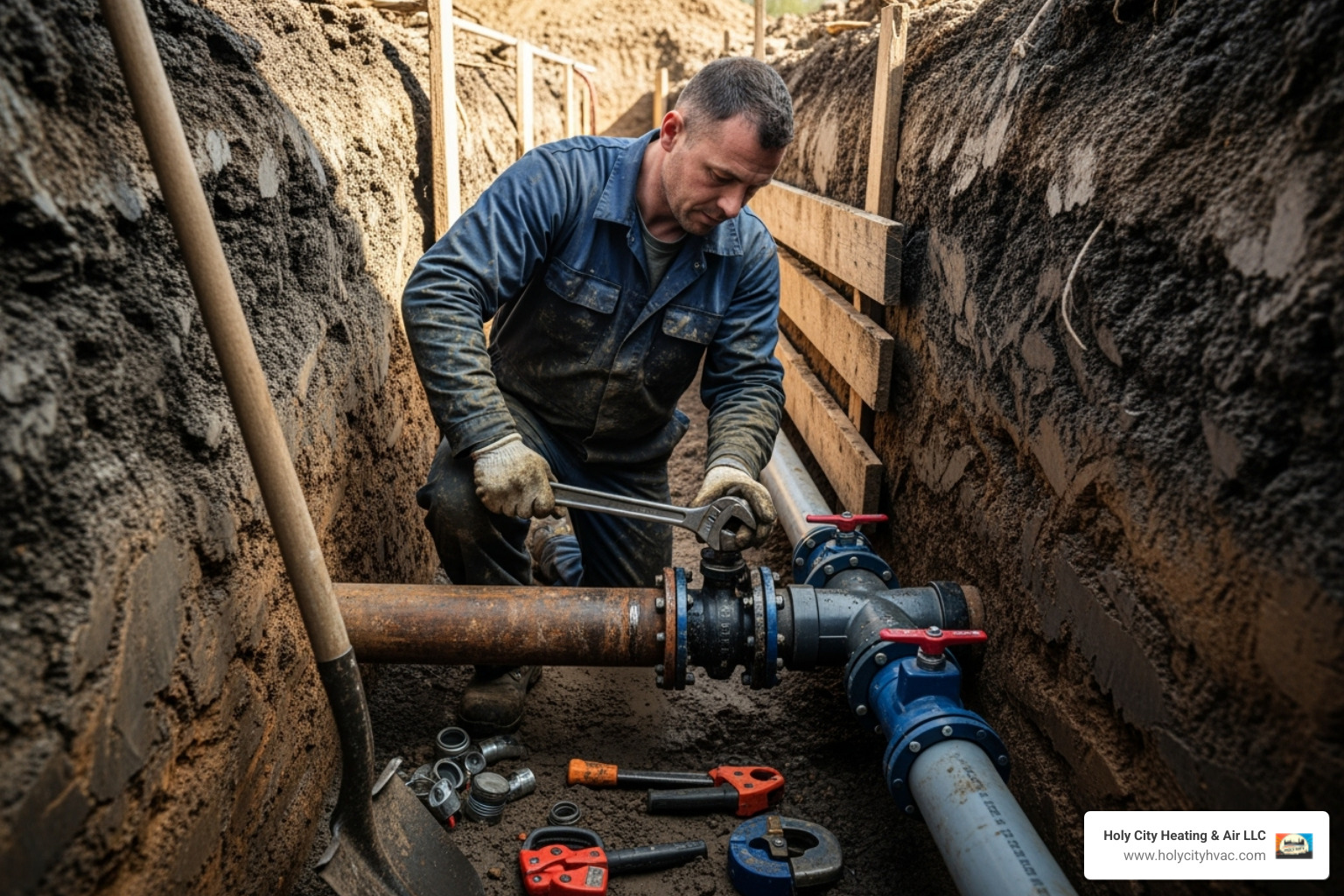
Step 1: Safety and Preparation
Safety is our first priority.
- Calling 811 (Call Before You Dig): This is a non-negotiable first step to locate all underground utility lines like gas and electric.
- Shutting off the main water valve: We immediately stop the water flow to prevent further property damage.
- Assessing the situation: We examine the break, identify the pipe type, and plan our repair strategy. Our team arrives with all necessary specialized tools and personal protective equipment (PPE).
Step 2: Excavation and Exposing the Pipe
This is where the heavy lifting begins.
- Digging the trench: We carefully excavate to access the pipe, which can be 3 to 10 feet deep, while minimizing damage to your landscaping.
- Trench safety: For deep trenches, we use shoring to prevent cave-ins, ensuring our crew's safety.
- Exposing the pipe: We pump out any excess water and clean the pipe area to get a clear view of the damage.
Step 3: The Repair: Cutting and Replacing the Damaged Section
This is the core of the water main repair.
- Assessing the damage: We determine if a simple repair clamp is enough or if a full section replacement is needed.
- Cutting and replacing: We use specialized cutters to remove the broken section cleanly. We then install a new pipe section, choosing the right material (like durable Copper, flexible PEX, or cost-effective PVC) to match your system and local codes.
- Securing connections: We use high-quality fittings and couplers to ensure a watertight, long-lasting repair.
Step 4: Testing and Restoring Your Yard
Our job isn't done until your water is on and your yard is restored.
- Testing the repair: We slowly restore water pressure and carefully check every connection for leaks.
- Backfilling the trench: We first place sand around the new pipe for protection, then backfill the trench.
- Restoring your landscaping: We replace topsoil and do our best to leave your yard looking as it did before we arrived.
Modern Solutions: Traditional vs. Trenchless Repair Methods
Not long ago, a broken water line meant digging up your entire lawn. Today, you have options. The choice between traditional and trenchless methods depends on your property, budget, and the specific problem.
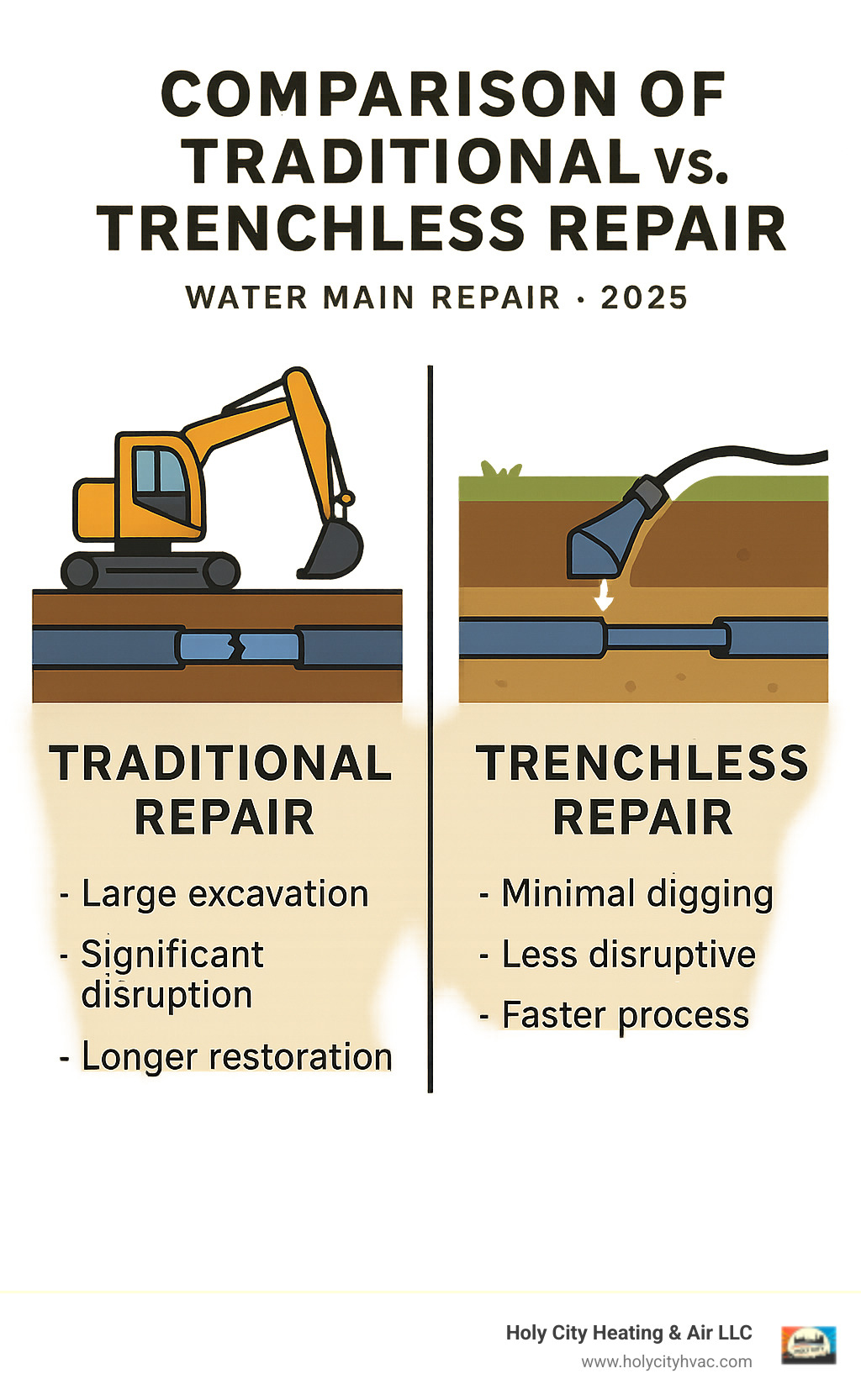
The Old-Fashioned Dig: Traditional Excavation
Traditional excavation is the tried-and-true method of digging a trench for direct access to the damaged pipe.
- Pros: It provides complete visual access, which is ideal for complex breaks or when replacing an entire line with new materials. There's no guesswork.
- Cons: It's destructive to landscaping, driveways, and sidewalks. The restoration process adds time and cost to the project.
The No-Dig Alternative: Trenchless Water Main Repair
Trenchless technology is the minimally invasive surgery of plumbing, requiring only small access points.
- Pipe bursting: We pull a new pipe through the old one, breaking apart the damaged pipe while simultaneously laying the replacement.
Pipe lining: We insert a resin-coated liner into the existing pipe, which then hardens to create a new, seamless pipe inside the old one.
Pros: This method is much faster, preserves your landscaping, and often has a lower total project cost when you factor in restoration savings.
- Cons: It's not suitable for all situations, such as a completely collapsed pipe or one with sharp bends.
We'll assess your pipe's condition and property layout to recommend the best approach for your water main repair.
The Price of Procrastination: Costs and Prevention
Putting off a water main repair can turn a minor issue into a major, costly emergency. Timely action can save you from a flooded yard and extensive damage.
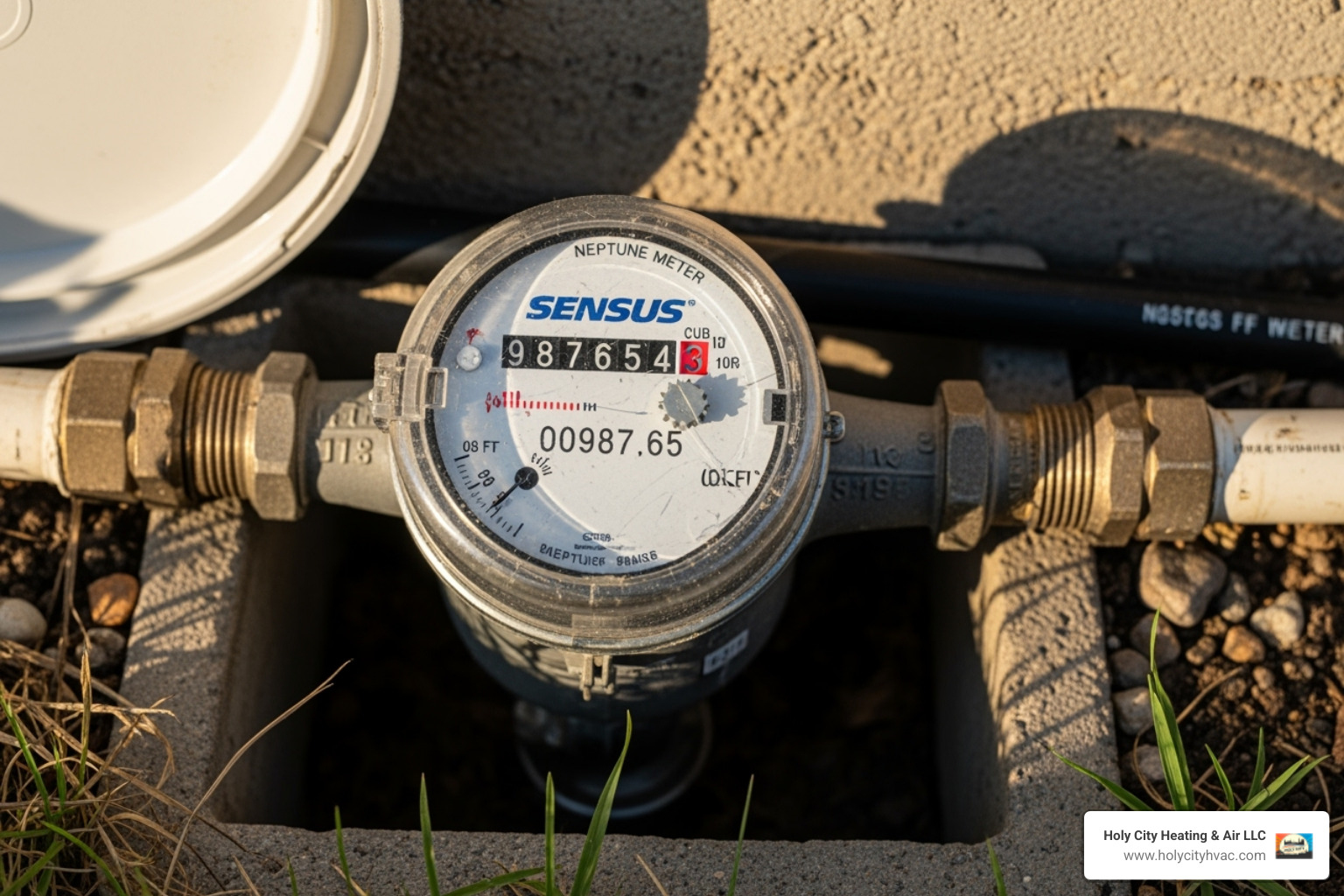
Breaking Down the Bill: What Influences Water Main Repair Cost?
Every repair is unique, but several factors influence the final cost:
- Type of repair: A simple clamp fix costs less than replacing an entire pipe section.
- Labor and time: Emergency calls and complex jobs require more time and expertise.
- Material costs: Copper is more expensive than PEX or PVC.
- Location and accessibility: A pipe under a driveway is harder to reach than one in an open lawn.
- Permit fees: Local municipalities require permits, which add to the cost.
The national average for water main repairs is typically $500 to $2,000, but complex jobs can cost more. We provide detailed estimates after assessing your specific situation.
An Ounce of Prevention: Protecting Your Water Line
Many water main repair emergencies are preventable. Proactive care can save you from future disasters.
- Regular professional inspections: Have your system checked every 2-5 years, especially in homes over 20 years old, to spot issues early.
- Pipe insulation: Protect exposed pipes from occasional Charleston cold snaps to prevent freeze damage.
- Know your pipe history: If you have old cast iron or galvanized pipes, plan for an eventual replacement.
- Manage tree roots: Use root barriers or schedule regular maintenance to protect pipes.
- Regulate water pressure: A pressure regulator can extend the life of your entire plumbing system.
- Consider protection plans: Many utilities offer plans that cover repair costs for a small monthly fee.
Taking these steps can save you thousands. For comprehensive plumbing maintenance, our team is here to help: More info about our plumbing services.
Frequently Asked Questions about Water Main Repair
When you're facing a water emergency, you have questions. Here are the answers to the ones we hear most often from Charleston homeowners about water main repair.
How long does a water main repair typically take?
It depends. A simple fix in an accessible spot might be done in a day. However, most repairs take 1 to 3 days. Factors like the pipe's depth, difficult soil conditions, or complex breaks can extend the timeline. We'll always provide a realistic schedule upfront and keep you informed.
Is the water safe to drink after a repair?
Yes, your water should be safe after a professional repair. We follow strict procedures to keep the line clean and disinfect new components. After the repair, we flush the system to clear out any air or sediment. You might see cloudy water or hear sputtering from faucets at first—this is normal. Run a cold water tap for a few minutes until the water runs clear. If discoloration persists, call us. For more information, the EPA offers excellent resources: Information on drinking water safety from the EPA.
Should I repair or replace my entire water line?
This is a tough question. A repair is a quick fix, but sometimes replacement is the smarter long-term investment.
- Consider the age: If your line is over 50 years old or made of corrosion-prone material like galvanized steel, replacement is often the better choice.
- Look at the history: If you've had multiple leaks, it's a sign the entire line is failing.
- Use the 50% rule: If a repair costs more than half the price of a full replacement, replacement usually offers better value.
A full replacement provides decades of peace of mind and can even add value to your home. We'll help you weigh the options to make the best decision for your situation.
Conclusion: Keep Your Water Flowing Smoothly
Your home's water main repair needs don't have to be a crisis. You now know the key signs to watch for, from soggy yards to high water bills. The importance of prompt action cannot be overstated, as a small leak can quickly become a major emergency.
Given the safety and complexity involved—from calling 811 to ensuring watertight connections—this is a job for professionals, not a DIY project.
That's where Holy City Heating & Air comes in. Since 2015, our licensed professionals have provided Charleston families with expert plumbing care backed by over 20 years of industry experience. We combine the resources of a growing company with the personal touch of a local business, ensuring the job is done right the first time.
Don't let a failing water line disrupt your life. If you see any warning signs or want a professional assessment of your pipes, we're here to help.
Contact our Mt. Pleasant plumbers for expert help. We're ready to keep your water flowing smoothly.
Recent posts






